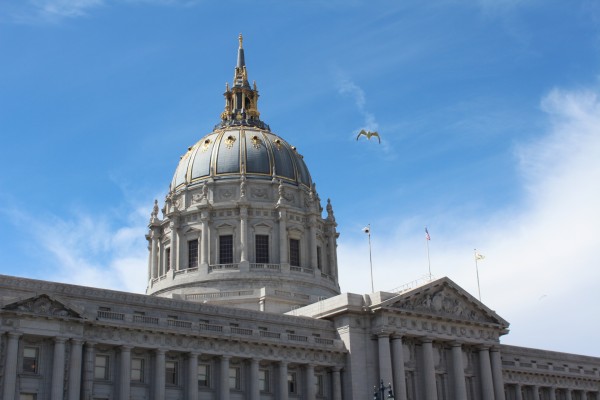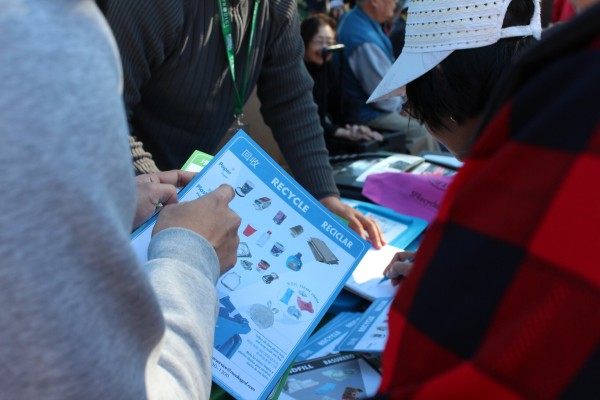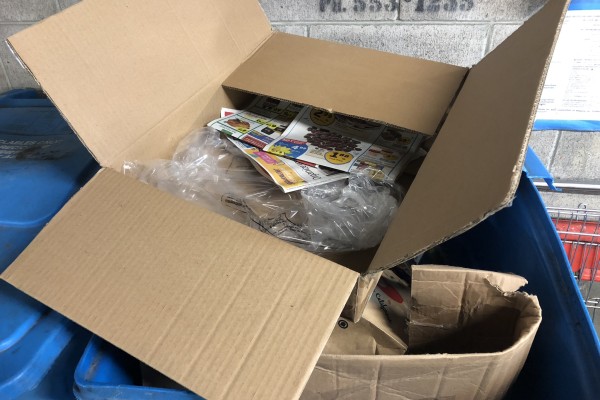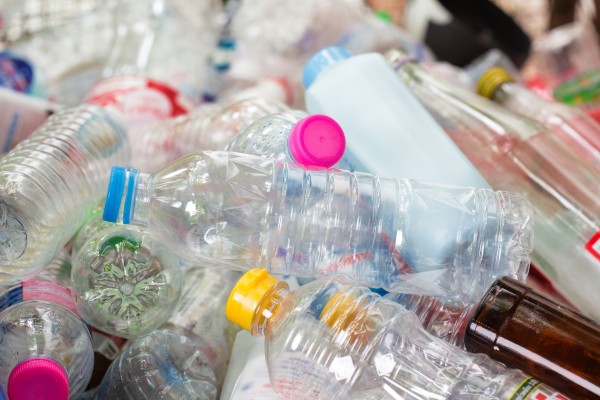The sale of food service ware and packing materials made from polystyrene foam is prohibited in San Francisco.
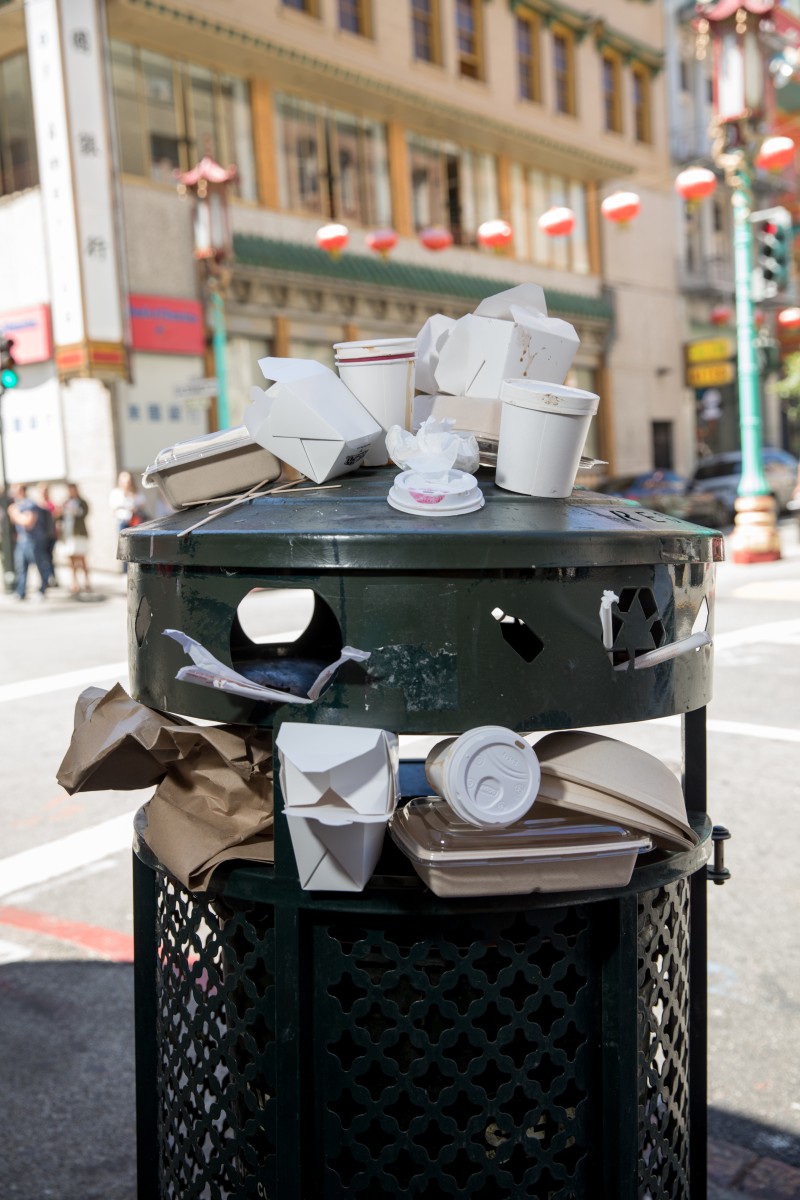
The law applies to anyone who sells or distributes food ware, packing materials, and other specified products, or anyone packaging products for sale within San Francisco.
For information about how to comply with the ordinance, please refer to the list of commonly asked questions below. You can also find resources, like downloadable PDF's and placards.
If you have specific questions about the Polystyrene Foam Ban, you can call (415) 355-3700 and a waste reduction specialist will return your call during weekday business hours. You can also send your message to our general email inbox.
Helpful documents
- No More Polystyrene Foam (Placard, PDF)
- Polystyrene Foam Ban Factsheet (Factsheet and Visual Guide to Packaging, PDF)
Vendors
- Vendors - Compostable or Recyclable Packaging (Vendor list, PDF)
- Foodware Purchasing Guide (PDF)
Letters Sent to Businesses
- Attention San Francisco Business Owners and Managers - Letter in English, Spanish, and Chinese - PDF)
- Español: Ley de reducción de desechos de San Francisco que prohíbe la espuma de poliestireno (PDF)
- 中文 : 三藩市泡沫聚苯乙烯禁令減廢法 (PDF)
Related ordinances
Food Service Waste and Packaging Reduction Ordinance (2016, extended)
Prohibits the sale of food service ware and other specified products including packing materials made from polystyrene foam or are non-recyclable and non-compostable. Read the policy (PDF) / legislative digest (PDF) / Regulations (PDF)/ Meat and Fish Tray Waiver (PDF)/ Meat and Fish Tray One Month Waiver (PDF)
Food Service Waste Reduction Ordinance (2006)
Prohibits the use of Styrofoam or polystyrene foam food service ware and requires the use of food ware that is compostable or recyclable. Learn more / Factsheet and FAQs (PDF) / Read the policy (PDF)
Frequently Asked Questions (FAQs)
Related ordinances
Food Service Waste and Packaging Reduction Ordinance (2016, extended)
Prohibits the sale of food service ware and other specified products including packing materials made from polystyrene foam or are non-recyclable and non-compostable. Read the policy (PDF) / legislative digest (PDF) / Regulations (PDF)/ Meat and Fish Tray Waiver (PDF)/ Meat and Fish Tray One Month Waiver (PDF)
Food Service Waste Reduction Ordinance (2006)
Prohibits the use of Styrofoam or polystyrene foam food service ware and requires the use of food ware that is compostable or recyclable. Learn more / Factsheet and FAQs (PDF) / Read the policy (PDF)
What is the Food Service and Packaging Waste Reduction Ordinance?
The Food Service and Packaging Waste Reduction (2016) prohibits the sale of food service ware and other specified products including packing materials that are made from polystyrene foam or that are non-recyclable and non-compostable.
When does the Food Service and Packaging Waste Reduction Ordinance go into effect?
The ordinance goes into effect starting January 1, 2017.
What businesses does the ordinance apply to in San Francisco?
The ordinance applies to anyone who sells or distributes food ware, packing materials, and other specified products.
What are the requirements of the new ordinance?
The ordinance bans the sale or distribution of the following products made, in whole or in part, from polystyrene foam:
- Food ware (including cups, plates, clamshells, and other containers)
- Packing materials* (including “peanuts” and shipping boxes, and when using within San Francisco to pack items sold, unless packing materials were donated or are reused and not sent to consumer or end user)
- Meat and fish trays, and egg cartons
- Coolers, ice chests or similar containers*
- Pool or beach toys*
- Dock floats, mooring buoys, or anchor or navigational markers*
* Unless they are wholly encased within a more durable material
The ordinance also requires that packing materials and disposable food ware sold or distributed must be accepted as compostable or recyclable in San Francisco’s collection programs.
What is polystyrene foam?
Polystyrene foam is extruded, blown or expanded polystyrene (EPS). It is a thermoplastic petrochemical material made with styrene. It is usually white and often used for packaging, such as loose-fill packaging “peanuts” or blocks, and food ware.
What products are acceptable alternatives to polystyrene foam?
Packing materials and disposable food ware sold or distributed in San Francisco must be compostable or recyclable in the City’s collection programs. Examples include those made with paper, cardboard, molded or rigid pulp or plastic, or certified compostable starch “peanuts”, loose fill or foam. Examples of products not compostable or recyclable include those made with polyurethane or polyethylene foam, or metallized film or paper. The Department of the Environment will adopt, post on its website, and regularly update a list of the types of acceptable alternative products that are compostable and recyclable.
What is the purpose of the ban?
Restricting the use of polystyrene foam and requiring it to be replaced with less-hazardous, compostable, or readily recyclable products will further protect the public health and safety of San Francisco’s residents, as well as its natural environment, waterways, and wildlife.
Polystyrene foam is one of the most commonly found plastic items on beaches and inland creeks, often breaks down into smaller pieces, making it more challenging to recover, and is easily ingested by wildlife. Polystyrene foam does not biodegrade in the environment and may persist for hundreds of years. It is a pollutant that breaks down into smaller pieces that are often mistaken for fish eggs by seabirds and other marine life. Unlike harder plastics, polystyrene contains a chemical used in the production process called “styrene” that is metabolized after ingestion and contaminates the food chain, including humans who consume contaminated marine wildlife.
The Food Service and Packaging Waste Reduction Ordinance helps advance the City’s goal of sending zero waste to landfill.
Isn’t polystyrene foam already banned in San Francisco?
San Francisco food service providers are already prohibited, under Environment Code Chapter 16, from using polystyrene foam (commonly referred to as StyrofoamTM) food containers, and this ordinance extends such prohibition to the sale and distribution of food ware and additional products in the city, where there are acceptable alternatives.
How is this ordinance different from the 2007 ordinance?
Since 2007, San Francisco has had a ban on polystyrene foam food ware for food prepared and served in San Francisco, which has successfully reduced polystyrene litter. However, remaining polystyrene foam it is still having a negative impact on the environment in that it is easily transported by wind and water, does not biodegrade, and is ingested by wildlife. This ordinance expands on the success of the food service ware ban in reducing polystyrene foam use and litter.
Who is responsible for enforcement?
The Department of Environment is responsible for enforcement of the Ordinance. The Department is committed to conducting education and outreach to businesses to ensure a smooth transition to safer alternatives. Penalties for non-compliance will be issued as a last resort and may result in fines.
Are there waivers available?
The Department of Environment may waive provisions of the ordinance in the following circumstances:
- If no reasonably feasible alternative exists for a specific product or product category.
- If a business has less than $500,000 annual income where there is no reasonably affordable alternative product available.
Requests for waivers must be submitted on a written application on a form approved by the Department. Waivers may be granted in whole or in part for up to 36 months.
Is polystyrene foam recyclable in San Francisco?
Polystyrene foam packaging and food service ware cannot be recycled through San Francisco’s recycling (blue bin) collection program as it can break into small pieces that are too difficult to handle. Polystyrene foam is otherwise difficult, uneconomical or impossible to recycle, especially if food soiled, and is not compostable. An estimated 1% of all polystyrene foam is recycled in California because of food contamination and the material’s bulky, easily airborne characteristics, given it is 95% air. Recycled polystyrene has very little market value and can only be used to make a small range of products, most of which cannot be recycled themselves.
What other cities have adopted and how is San Francisco’s different?
More than 100 U.S. cities have ordinances restricting polystyrene food ware and/or packaging materials. There are now 97 cities and counties in California and more than 20 in the Bay Area with polystyrene foam bans. The Regional Water Control Board has recognized product bans as an effective way to prevent trash pollution in our waterways. San Francisco’s ordinance is now the most expansive ban on polystyrene in the country because of the breadth of products covered.
